Real Estate Tokenization Investment Calculator
How Tokenized Real Estate Works
This calculator helps you understand potential returns from tokenized real estate investments compared to traditional real estate. Based on data from the article showing 6.2% annual returns with $1,000 minimum investments.
Compare to traditional real estate:
• Entry cost: $1,000 minimum vs. $500,000+
• Liquidity: Trade in minutes vs. 6-12 months
• Costs: 0.5-2.5% platform fee vs. 3-6% broker fees
What Is Real Estate RWA Tokenization?
Real estate RWA tokenization is turning physical property into digital tokens on a blockchain. Each token represents a share of ownership in a building, apartment complex, or commercial space-just like owning a single share in a company. Instead of needing $1 million to buy a whole office tower, you can buy $1,000 worth of tokens and own a tiny slice of it. This isn’t science fiction-it’s happening right now, with over $13.5 billion in tokenized real estate assets traded globally by the end of 2024.
The key difference from traditional real estate investing is control and access. With tokenization, you’re not buying through a broker or a REIT. You’re buying directly on a blockchain, where every transaction is recorded permanently. Ownership is transparent, transferable, and programmable. Smart contracts handle rent collection, dividend payouts, and compliance checks automatically. No middlemen. No paper forms. No waiting weeks for a closing.
How It Works: The Five-Step Process
Tokenizing a property isn’t as simple as uploading a deed to a website. It’s a structured, legal, and technical process that takes 3 to 5 months. Here’s how it actually works:
- Asset Selection - The owner picks a property to tokenize. Commercial buildings, multi-family rentals, and development projects are the most common. Single-family homes are rare because managing tenants on-chain adds complexity.
- Legal Structure Setup - A Special Purpose Vehicle (SPV) is created. This is a legal entity, usually a limited company, that holds the real estate. The tokens represent shares in the SPV, not direct ownership of the land. This keeps everything compliant with existing property laws.
- Token Minting - Digital tokens are created on a blockchain, most often Ethereum using the ERC-20 standard. Each token has a fixed value and represents an equal portion of the property’s equity. A $50 million building might be split into 50,000 tokens worth $1,000 each.
- Smart Contract Programming - Rules are coded into the blockchain. For example: rent payments from tenants go into a digital wallet, 80% is distributed to token holders quarterly, 15% goes to property management, and 5% covers taxes. Compliance checks ensure only accredited or verified investors can buy.
- Token Distribution - Tokens are listed on regulated digital marketplaces like Brickken, Securitize, or SIX Digital Exchange. Investors can buy, sell, or hold them 24/7, unlike traditional real estate markets that close at 5 p.m.
Behind the scenes, oracles like Chainlink connect the blockchain to real-world data-rent rolls, property appraisals, insurance certificates-so the smart contracts know what’s happening off-chain.
Why Tokenization Beats Traditional Real Estate Investing
Compare this to buying a rental property the old way:
- Entry Cost - Traditional: $500,000-$2 million. Tokenized: $1,000-$5,000 minimum.
- Liquidity - Traditional: Takes 6-12 months to sell. Tokenized: Can sell in minutes on a digital exchange.
- Transparency - Traditional: You get a quarterly report from your property manager. Tokenized: Every rent payment, expense, and payout is visible on a public blockchain explorer.
- Costs - Traditional: 3-6% broker fees, 1-2% property management fees, legal fees. Tokenized: 0.5-2.5% annual platform fee. No broker. No escrow.
- Global Access - Traditional: You need to be in the country. Tokenized: A student in Manila can own part of a New York warehouse.
Take the example of a $50 million commercial building in Manhattan. Tokenized by Securitize in 2023, it issued 50,000 tokens. Investors received 6.2% annual returns paid out quarterly. One investor on Reddit bought five tokens ($5,000) and got $290 in dividends within 14 months. No property manager called him. No paperwork. He just checked his wallet.

The Downsides: Risks You Can’t Ignore
Tokenization isn’t magic. It has serious flaws.
Regulation is a mess. Only 37% of countries have clear rules for RWA tokenization. In the U.S., the SEC treats these tokens as securities. In Switzerland, they’re treated like shares. In most places, you’re operating in a gray zone. If the government changes the rules, your tokens could become worthless-or frozen.
Liquidity isn’t guaranteed. Just because you can sell doesn’t mean someone will buy. Many platforms have thin trading volumes. One investor on Trustpilot said he couldn’t sell his tokens for 90 days, even during a market crash. Lockup periods are common.
Legal enforceability is untested. If the SPV owner disappears or refuses to pay dividends, can you sue? Can you force a sale? In most jurisdictions, the answer is: we don’t know. The blockchain records ownership, but courts still rely on paper deeds.
Technical risks exist. Ethereum handles only 15-30 transactions per second. During high demand, gas fees spike. Smart contracts can have bugs. One tokenized property in Colorado had a coding error that delayed dividend payments for six weeks.
And then there’s the learning curve. Most traditional real estate investors don’t know what a wallet is. They don’t understand private keys. A CoinDesk survey found 63% of early adopters were confused whether they owned the property-or just shares in a company that owned it.
Who’s Leading the Way?
Big names are jumping in. BlackRock launched BUIDL in 2023, starting with U.S. Treasury bonds-but expanded into tokenized commercial real estate in July 2024. JPMorgan is testing tokenized commercial mortgages. Fidelity filed for a tokenized real estate fund in March 2024. Even institutional investors who used to avoid crypto are now allocating capital here.
Geographically, adoption is concentrated in places with clear rules:
- Switzerland
- Liechtenstein
- United Arab Emirates
- Singapore
- Wyoming and Colorado (U.S.)
These regions have created legal frameworks that treat tokenized assets as legitimate property interests. In the U.S., the SEC’s Digital Assets Task Force is now actively reviewing tokenized real estate cases. The EU’s MiCA regulation, effective December 2024, is the first comprehensive law covering RWA tokenization across 27 countries.
And now, the Real Estate Tokenization Standard (RETS) was launched in May 2024 to standardize how properties are valued, reported, and audited-something that’s been missing.
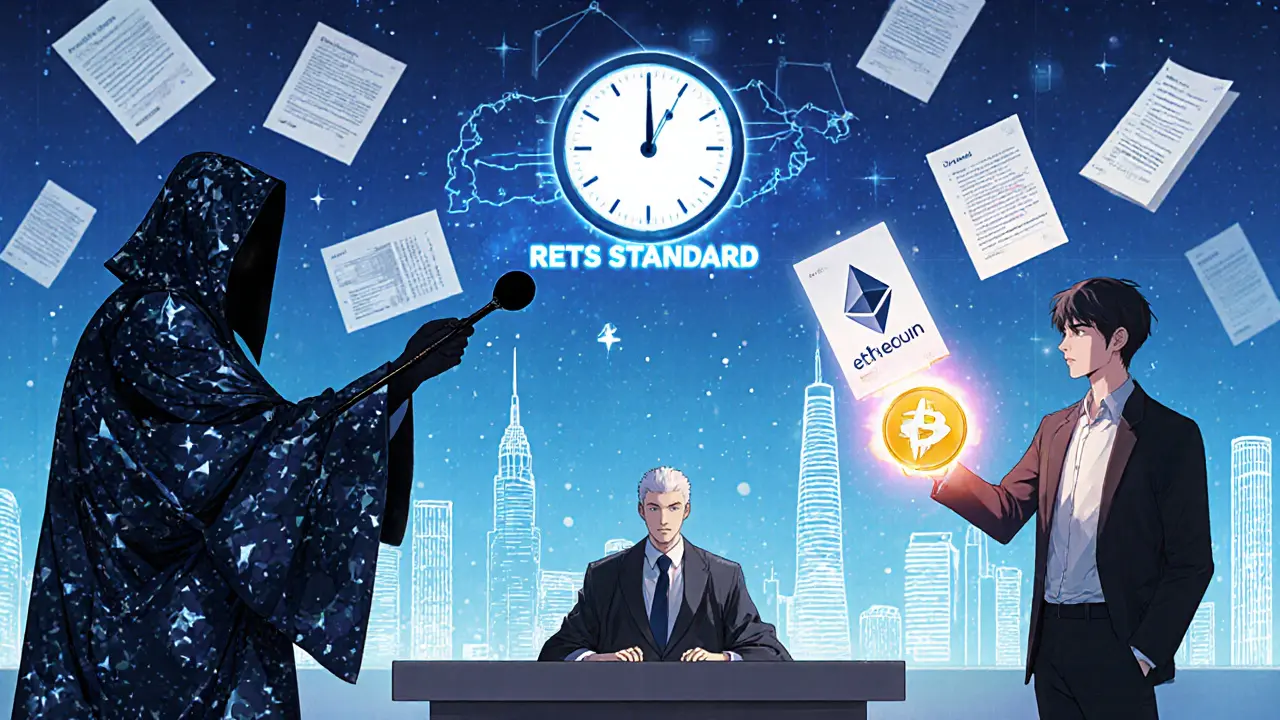
What’s Next? The Roadmap to 2030
The market is growing fast. McKinsey predicts $2 trillion in tokenized assets by 2030. Others say $16 trillion. The difference? It depends on whether regulation catches up.
Here’s what’s coming next:
- Regulated Exchanges - SIX Digital Exchange plans to launch a dedicated real estate token trading platform in Q2 2025.
- CBDs for Settlement - 14 countries, including Singapore and Sweden, are testing central bank digital currencies for instant, low-cost settlement of token trades.
- Interoperability - New standards are being built so tokens on Ethereum can move to Solana or Polygon without losing legal status.
- AI + Tokenization - Platforms are starting to use AI to predict rental yields, detect fraud in property documents, and automate compliance checks.
Deloitte predicts that by 2027, 25% of new commercial real estate deals will use tokenization to onboard investors-cutting the time to raise capital from 6 months to 30 days.
Should You Get Involved?
If you’re a retail investor: Start small. Use a regulated platform like Brickken or Securitize. Only invest what you can afford to lock up for a year. Understand you’re buying shares in an SPV-not the building itself. Read the legal docs. Don’t assume blockchain = guaranteed ownership.
If you’re a property owner: Tokenization can unlock capital fast. But the upfront cost is $75,000-$250,000. You’ll need lawyers, blockchain developers, and property appraisers. Partner with a firm that understands both real estate and crypto. JLL’s partnership with Securitize on a $22 million LA office building shows how it’s done right.
The bottom line? Real estate RWA tokenization isn’t replacing traditional investing. It’s expanding it. It’s giving people who never had access to commercial property a way in. It’s making markets more efficient. But it’s still early. The rules are being written as we speak. The technology works. The legal system is catching up. And the money is flowing.
If you’re waiting for everything to be perfect-you’ll miss it. If you’re willing to learn, stay cautious, and start small-you could be part of the next big shift in property ownership.
Are tokenized real estate tokens the same as owning property?
No. Tokenized real estate represents ownership in a legal entity-usually a Special Purpose Vehicle (SPV)-that holds the physical property. You don’t get a deed to the land. You own shares in the company that owns the building. This structure is used to comply with existing property laws. The blockchain tracks your shares, but your legal rights come from the SPV’s governing documents, not the blockchain itself.
Can I live in a tokenized property?
Generally, no. Tokenized real estate is designed for investment, not personal use. Most tokenized assets are commercial buildings or multi-family rental complexes. Even if you own 10% of a 10-unit apartment building, you don’t get to move into one of the units. The property is managed by a professional firm, and tenants are selected and leased out by them. Some pilot projects are testing co-ownership models for vacation homes, but these are rare and legally complex.
Is tokenized real estate regulated in the U.S.?
Yes, but inconsistently. The U.S. Securities and Exchange Commission (SEC) treats real estate tokens as securities, meaning they must be registered or qualify for an exemption like Regulation D or Regulation A+. Platforms like Securitize and Harbor operate under these rules. However, state laws vary. Wyoming and Colorado have passed supportive laws. In most other states, the legal status is unclear. Investors should only use platforms that are SEC-compliant and provide full legal disclosures.
How are taxes handled on tokenized real estate income?
In the U.S., dividend income from tokenized real estate is taxed as ordinary income or qualified dividends, depending on holding period. The platform should issue a 1099-DIV form. Capital gains apply if you sell your tokens for a profit. The U.S. Treasury issued new guidance in October 2024 clarifying that tokenized real estate is treated like traditional REIT distributions for tax purposes. Investors should keep records of all purchases, sales, and dividend payments on-chain.
What happens if the platform shuts down?
Your tokens are stored in your own crypto wallet, not on the platform. Even if Brickken or Securitize goes offline, your tokens still exist on the blockchain. You can still transfer them to another wallet or sell them on a different marketplace-assuming one exists. The bigger risk is if the SPV managing the property fails or the legal structure collapses. That’s why it’s critical to invest in platforms with strong legal backing and reputable property managers.
How do I know if a tokenized property is legitimate?
Look for three things: (1) A licensed, audited SPV with public legal documentation; (2) A regulated platform with SEC or EU MiCA compliance; (3) Independent third-party property valuation and rent roll verification. Avoid platforms that don’t show the underlying property documents, appraisals, or legal structure. If they won’t let you review the SPV’s operating agreement, walk away.

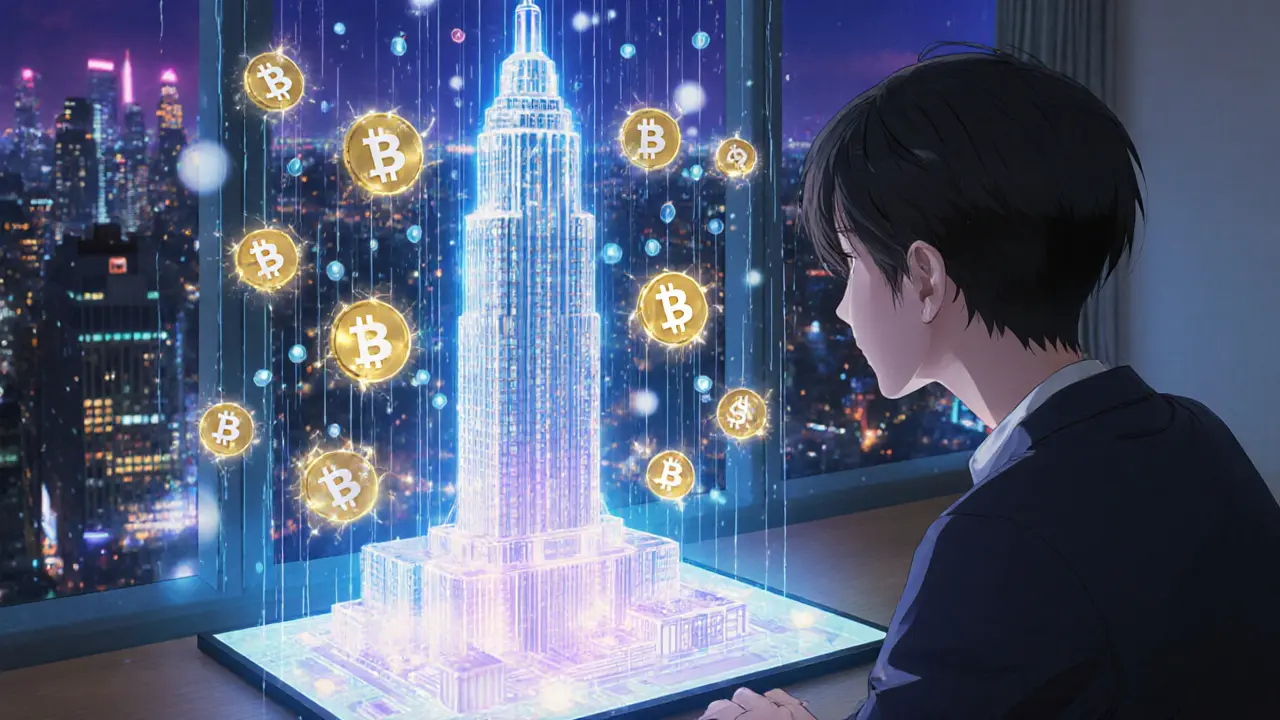
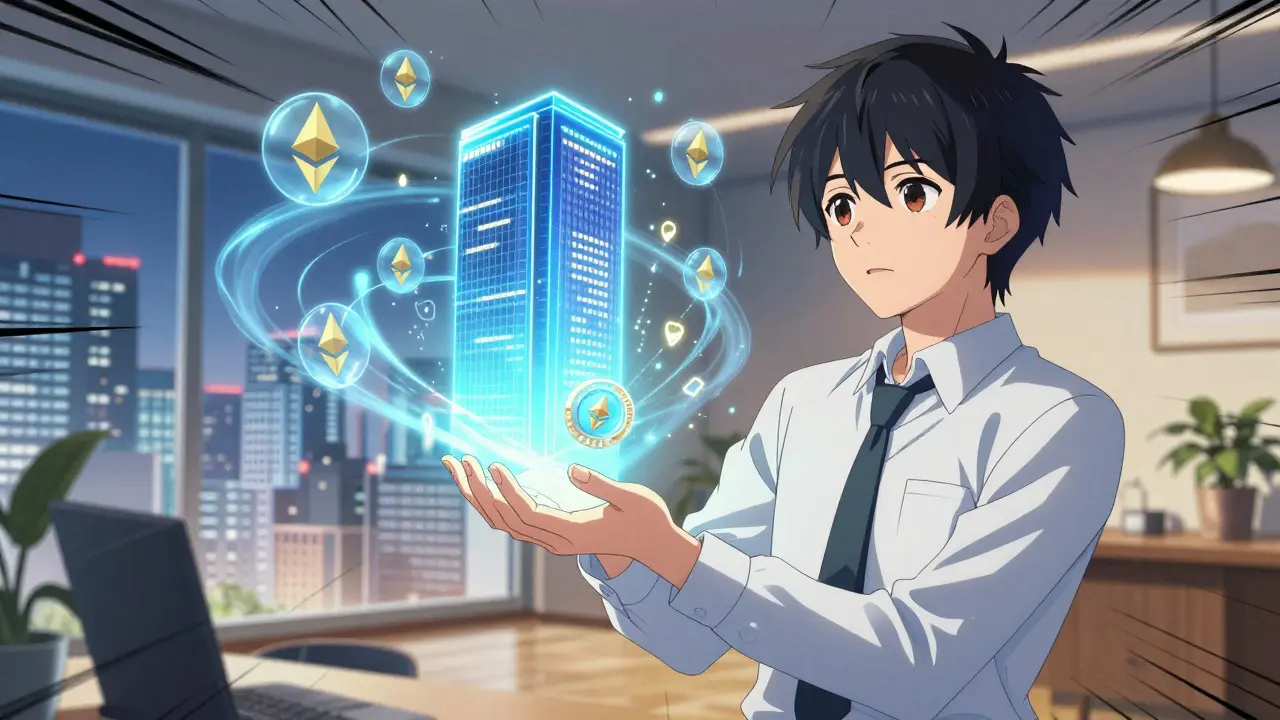

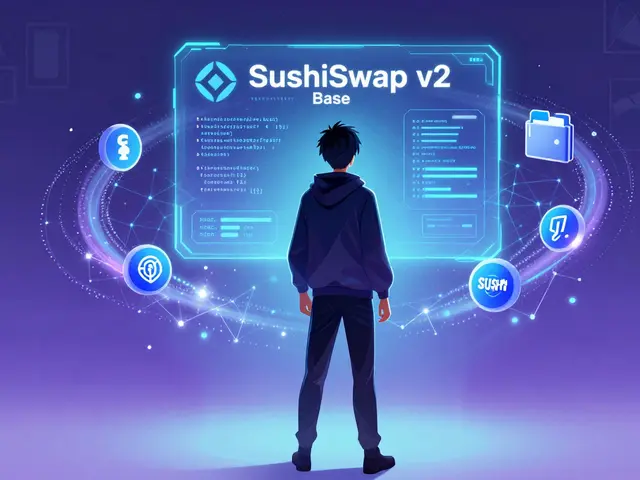

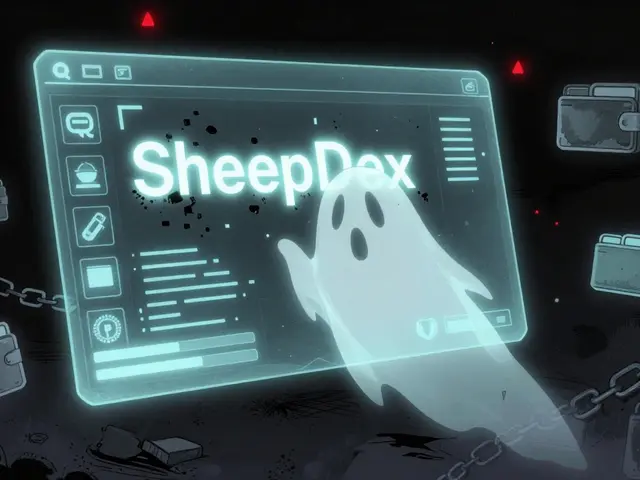
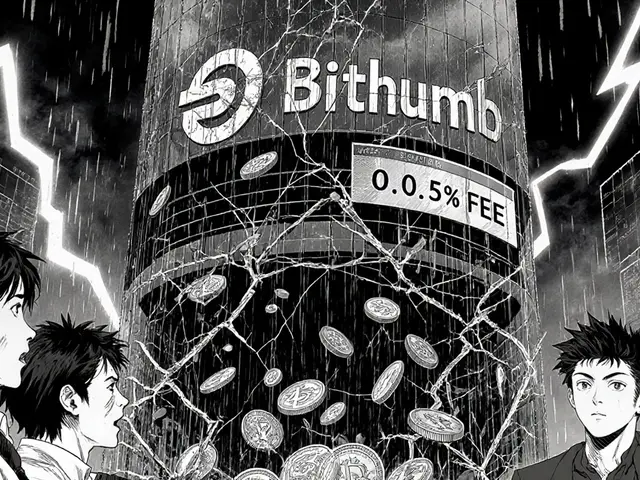
Matt Zara
October 29, 2025 AT 16:53Jean Manel
October 31, 2025 AT 01:25William P. Barrett
October 31, 2025 AT 09:02Cory Munoz
November 2, 2025 AT 06:22Jasmine Neo
November 3, 2025 AT 21:56Allison Andrews
November 4, 2025 AT 21:35Wayne Overton
November 5, 2025 AT 07:07Alisa Rosner
November 6, 2025 AT 04:50MICHELLE SANTOYO
November 7, 2025 AT 06:07Olav Hans-Ols
November 8, 2025 AT 08:21Kevin Johnston
November 10, 2025 AT 00:38Dr. Monica Ellis-Blied
November 11, 2025 AT 23:43Herbert Ruiz
November 13, 2025 AT 10:47Saurav Deshpande
November 14, 2025 AT 21:57Paul Lyman
November 16, 2025 AT 09:16Pranav Shimpi
November 17, 2025 AT 17:05Kirsten McCallum
November 18, 2025 AT 10:20Henry Gómez Lascarro
November 19, 2025 AT 07:36